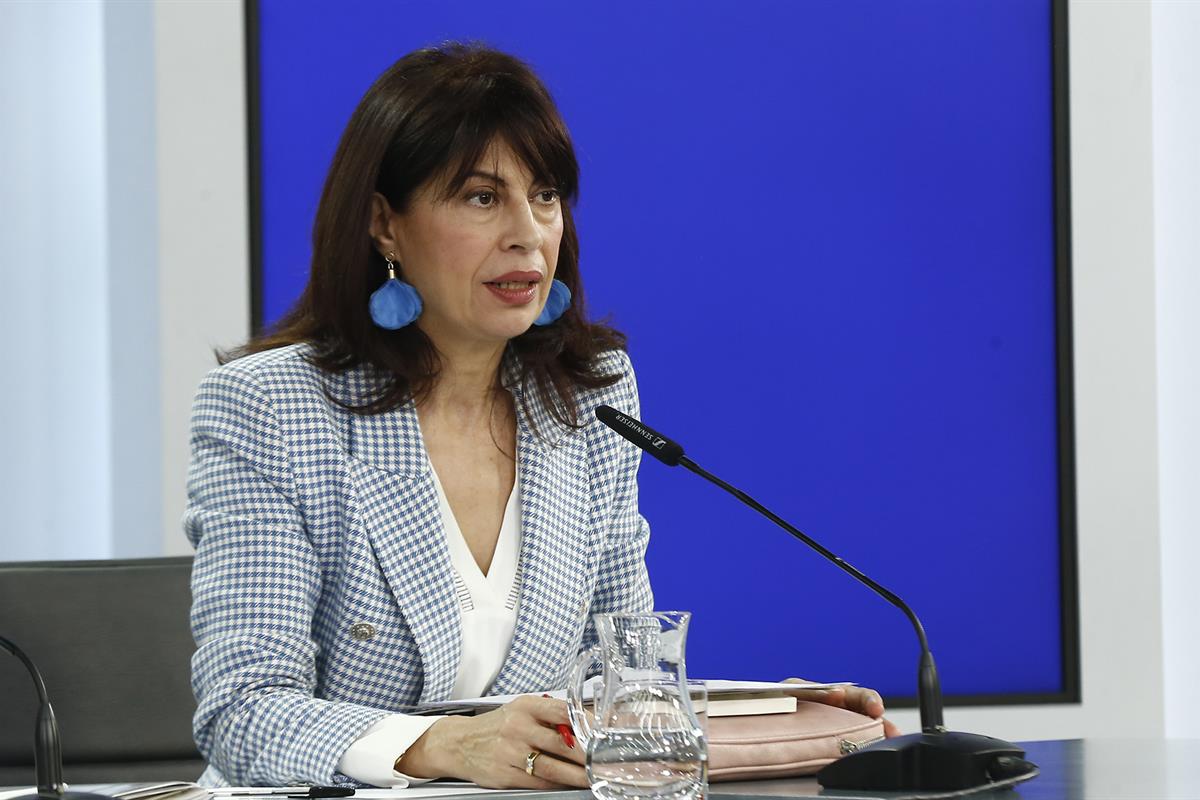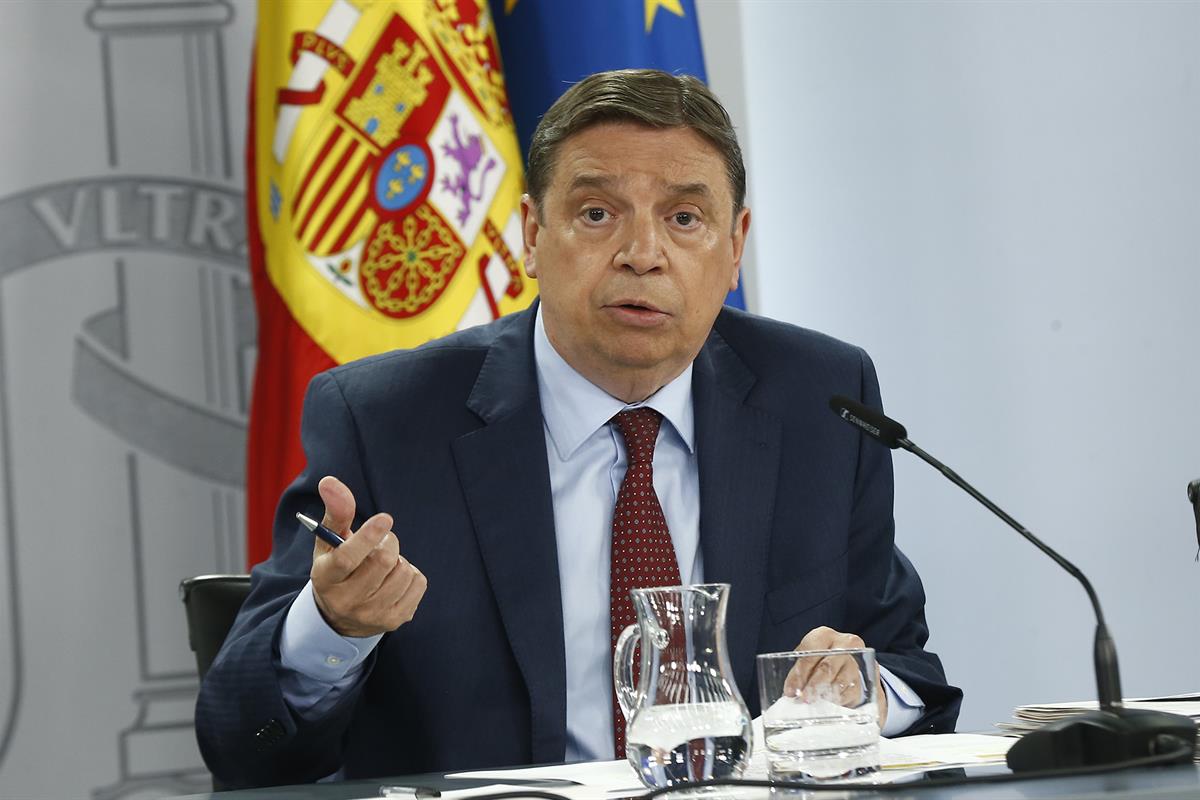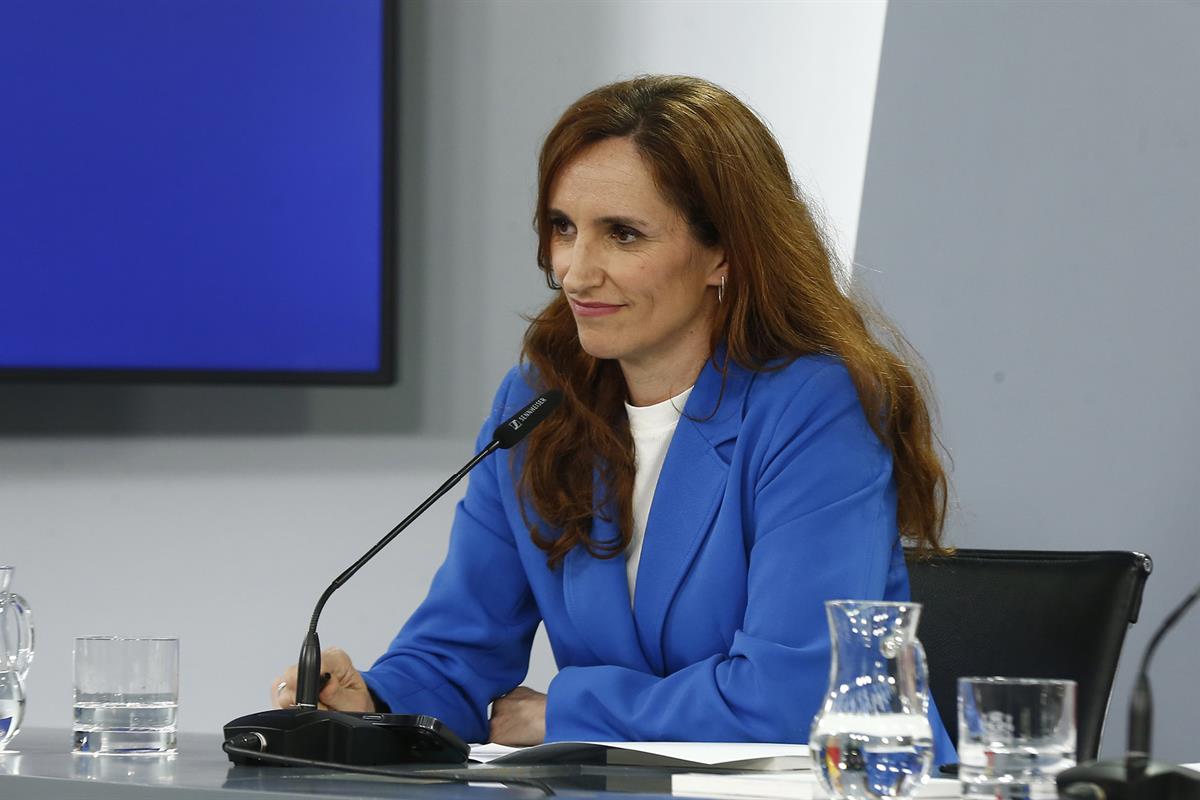Council of Ministers
The Government of Spain allocates €160 million to the autonomous communities to fight against gender violence
Council of Ministers - 2024.4.16
Moncloa Palace, Madrid
 The ministers, Mónica García, Pilar Alegría, Luis Planas and Ana Redondo, at the press conference after the Council of Ministers (Pool Moncloa / José Manuel Álvarez)
The ministers, Mónica García, Pilar Alegría, Luis Planas and Ana Redondo, at the press conference after the Council of Ministers (Pool Moncloa / José Manuel Álvarez)
The Council of Ministers has authorised the distribution of more than €160 million to the communities and the autonomous cities of Ceuta and Melilla to combat gender violence. The distribution of the amounts will be determined at the next Sectoral Conference on Equality, scheduled for 29 April.
The Minister for Equality, Ana Redondo, has detailed that €19.8 million will be invested in different regional programmes and plans. Of these, €4.25 million are earmarked for services that guarantee integrated social care for victims of gender-based violence; another €4.25 million for specialised care for underage victims; €1 million to coordinate gender-based violence units throughout the country; €9.5 million to finance support programmes for victims of sexual aggression; and the remaining €800,000 for programmes to prevent the sexual exploitation of minors under guardianship.
Ana Redondo also specified that more than €140 million will be used to develop the measures included in the State Pact against Gender Violence, which was agreed in 2017.
Redondo recalled that the Lower House of Parliament has a subcommittee that is reviewing and evaluating the measures included in this pact to review and strengthen it with the inclusion of new types of male violence, such as victimisation. In this context, the minister indicated that the budgetary allocation has already increased by 40% in the last two years.
State Observatory on Violence against Women
 The Minister for Equality, Ana Redondo, during her speech at the press conference after the Council of Ministers | Pool Moncloa / José Manuel Álvarez
The Minister for Equality, Ana Redondo, during her speech at the press conference after the Council of Ministers | Pool Moncloa / José Manuel Álvarez
Both the Minister for Education, Vocational Training and Sports and Government Spokesperson, Pilar Alegría, and the Minister for Equality referred to the extraordinary meeting of the State Observatory of Violence against Women, which was chaired for the first time by the chief executive, Pedro Sánchez, who stated that the review of the State Pact against Gender Violence is an absolute priority.
Both reported that the meeting, which was attended by more than 50 people, was convened following the tragic events that occurred in the first four months of the year: 10 women killed by male violence and 7 children killed by vicarious violence.
Pilar Alegría highlighted the Executive's firm commitment to the fight against violence against women and minors: "It is essential that we continue to deploy the necessary policies, provide resources and, of course, work on the protection of victims and their families".
In the same line, the Minister for Equality stressed that Pedro Sánchez has pledged to continue fighting relentlessly against this type of violence to "advance towards a real democracy where women have equal opportunities and feel safe with their children". Furthermore, she announced that the president will convene at least two meetings of the observatory per year to test and monitor policies and incorporate new measures.
Ana Redondo explained that the need to incorporate coordination measures between administrations has been detected. To this effect, on Friday she will meet with all the violence units of the Government delegations and sub-delegations to reinforce initiatives to support their activities.
There will also be a focus on the training of all agents working in the field of gender violence, the creation of specialised units and the raising of social awareness. In this regard, traditional and online campaigns will be promoted to qualify or mitigate the effects of negationist discourses promoting hatred and violence, which target young people, especially through social networks.
The minister remarked that all these initiatives will be analysed, specified and implemented after the meeting of the subcommittee that is reviewing and reconsidering the agreements of the State Pact against Gender Violence, a "useful instrument" for eradicating this type of violence.
Commitment to the rural environment and the primary sector
 The Minister for Agriculture, Fisheries and Food, Luis Planas, during his speech at the press conference after the Council of Ministers | Pool Moncloa / José Manuel Álvarez
The Minister for Agriculture, Fisheries and Food, Luis Planas, during his speech at the press conference after the Council of Ministers | Pool Moncloa / José Manuel Álvarez
The Council of Ministers has approved the distribution of almost €208 million among the autonomous communities for actions related to rural development, agriculture and livestock farming. "This is yet another example of the involvement and commitment of this Government to the rural environment and to our primary sector," said the Minister for Agriculture, Fisheries and Food, Luis Planas.
The first block of funds, worth €158.2 million, corresponds to state co-financing of rural development actions under the Common Agricultural Policy (CAP) carried out by the autonomous communities. These programmes seek to strengthen the agri-food industry, encourage young people's incorporation into the rural world and promote equality in this area, among other objectives.
Luis Planas stressed that the co-financing of these programmes by the Government of Spain will increase by 28% in the period 2021-2027 compared to the period 2014-2020.
Plant and animal health and production quality
The other appropriation approved today amounts to €49.6 million and is destined for initiatives to support the agricultural and livestock sector.
The largest item, with €21 million, goes to POSEI, the Community support mechanism for agricultural and livestock production in the Canary Islands.
More than €10.5 million will finance pest prevention and control. The minister pointed out that this is a "key element to ensure the continuity of our agricultural production, especially in a context of climate change and the unfortunate reality of the appearance of new pests throughout EU territory".
Third, €8.8 million are earmarked for animal disease eradication programmes which, according to Plana, is an issue with "serious implications for public health and for the export of livestock products". These funds will cover needs such as compulsory slaughter in cases of brucellosis or bovine tuberculosis and the purchase of vaccines for the prevention of bluetongue, among others.
Other lines of action include support for the beekeeping sector (Spain is the leading honey producer in the EU), especially small-scale and transhumant beekeepers, improving the quality of plant varieties, promoting indigenous breeds and improving the competitiveness of dairy farms (cattle, sheep and goats).
According to Luis Planas, the common objective is for Spain to preserve its livestock heritage, one of the most important in Europe, and also to continue to be a benchmark in fruit and vegetable production.
New neonatal screening
 The Minister for Health, Mónica García, during the press conference after the Council of Ministers | Pool Moncloa / José Manuel Álvarez
The Minister for Health, Mónica García, during the press conference after the Council of Ministers | Pool Moncloa / José Manuel Álvarez
The Government has analysed a report on the implementation of new neonatal screening to be included in the common portfolio of services of the National Health System, as announced yesterday by the President of the Government during his visit to the Central University Hospital of Asturias.
Neonatal screening (heel prick) currently includes the analysis of seven pathologies. The number of congenital diseases tested will be increased to 18 by the end of the year and to 23 in the first quarter of 2025.
The Minister for Health, Mónica García, indicated that this measure will have an impact on "equity, disease prevention and equal opportunities at birth". "We want to standardise and homogenise equal opportunities in terms of preventing irreversible damage detected by the heel test," he added.
Middle East: European round of contacts and condemnation of Iran's attack
 The Minister for Education, Vocational Training and Sports and Government Spokesperson, Pilar Alegría, during her speech at the press conference after the Council of Ministers | Pool Moncloa / José Manuel Álvarez
The Minister for Education, Vocational Training and Sports and Government Spokesperson, Pilar Alegría, during her speech at the press conference after the Council of Ministers | Pool Moncloa / José Manuel Álvarez
During her speech at the press conference following the Council of Ministers, the Government spokesperson, Pilar Alegría, recalled that Pedro Sánchez is continuing his round of visits to his European counterparts to address the situation in Gaza. In this context, the spokeswoman informed that the chief executive will now be meeting with the prime ministers of Slovenia, Luxembourg, Belgium and Malta.
Alegría also highlighted that this week Sánchez has received the support of the Australian Prime Minister, Anthony Albanese, for his approach to the Israeli-Palestinian state solution. "From the outset, the Government of Spain has been working for peace, security and stability in the Middle East through the creation of the Palestinian state and recognition of the two states", said Alegría, who also explained that this will be the position of the Minister for Foreign Affairs, José Manuel Albares, at the next meeting of the United Nations Security Council.
She also referred to Iran's attack on Israel: "The Government of Spain has condemned the attack, as it has condemned and will always condemn all forms of violence that threaten the security and well-being of the civilian population," concluded Alegría, who stressed that Spain's objective in the Middle East is still to achieve "peace, stability and security for all".
Non official translation




